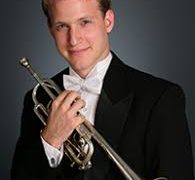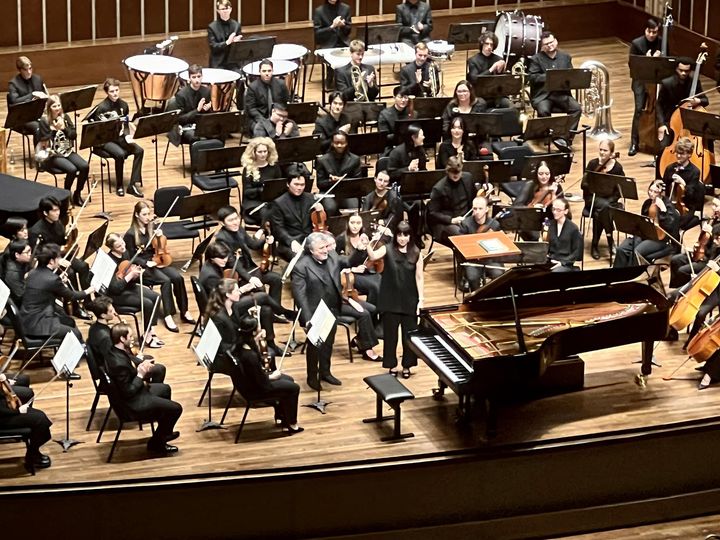Young maestro move: American winner takes Paris agent
mainJonathon Heyward, 23, winner of the Besançon conductors competition, has signed with Paris-based boutique agency, CLB
Jonathon is currently based in London, where he is studying with Sian Edwards.






It is wrong that such a talented but unnexperienced conductor is getting concerts with major orchestras. I am tired of playing for the “new stars”, young, atractive and charismatic (Duda 9 years ago for example, for example), but with no experience… what happens is that we, the orchestra, is doing all the work while the conductor is doing “photo positions” (yes, conducting gestures that are great for a picture but that are useless for us) and providing the music (the version, the sound etc.). No conductor should be allowed to stand on the podium of a major orchestra before 35.
What a ridiculous statement! There are several young conductors with talent and skill doing an excellent job everywhere.
It seems that the majority of orchestral musicians here don’t agree with you.
Thirty-five might be a bit high but otherwise agree 100% with your statement.
As a former orchestral player, I can say that there is really something to what you say. When was thirty-five and management put a baby on the podium, the general reaction was “what is this one going to teach us about Beethoven?” The answer was consistently “nothing”. Then someone like Walter Weller would come, and the contrast was all too painfully obvious. Conducting has become show business, and it is one of the easiest endeavors within which a charlatan may hide.
Yes, yes, yes, yes, yes. It’s utterly absurd to imagine that a 20- or 25- year old, who has never had to worry about cost, availability of players, or indeed problem solving in general, gets plonked in front of a great orchestra and is suddenly a ‘great’ him/her self.
The opportunities out there rely so heavily on who you know (rather than what you know) that even getting in front of one professional orchestra is next to impossible. There are so many really good and experienced musicians out there who are more able in every respect than the latest ‘product’; I’d love to see Robin Ticciati, for instance, teach an amateur group to play the Rite of Spring in circumstances where he only gets every player in the same room for one rehearsal, and has to explain every last detail of rhythm and intonation. As for how such a person would succeed in all the financial hassle and wheeler-dealing that goes on to organise a performance of a big choral work…
What’s more concerning about conducting competitions is that they are usually open only to the under-35s. When you’re 35, you’re just about getting to understand how to do the job.
Strange perspective. “Never” had to worry about these things? Most of the young conductors I know were recently students. They’ve only just got past the stage of assembling their own orchestras to try out repertoire; those that haven’t have been recently been orchestral players themselves. And they’ve all had the experience of working with amateur orchestras and young people, and learning to make music without professional resources or support. I know a recent LAPO assistant who was until recently playing tuba in a Shropshire brass band, a Salzburg competition winner who spends each summer single-handedly assembling and promoting concerts with a 100-piece student orchestra, and a rising talent at the BBC who until recently conducted amateur string groups in a suburb of a UK city.
They’re humble, practical, hard-working, and intensely aware of the hard realities of the business they’re in. They’re deeply aware of the privilege of working with a great orchestra, when they’re offered it. They’ve also all had the experience of being cold-shouldered and belittled by jaded old professionals in second-rate orchestras. I wouldn’t say any of them is great-looking. But they are superb young musicians, and deeply committed to what they’re doing.
Equally, I’ve been on the receiving end of the fallout when silver-haired “great artists” have failed to prepare, when they’ve demanded chauffeurs and exclusive hotel suites, and when they’ve become so used to coasting on their reputation that there’s nothing they think can’t be arranged via the simple expedient of shouting abuse at someone who earns less than them…
yes
Yes, but you are totally overlooking his perfect maestro hairstyle. The locks are more important than the music, and you should know that by now.
I coudln’t agree more. Conductors are denied time to study, to mature, to grow, to have something to say about the music they perform. For instance, many high-level courses are closed to conductors over 30 (Muti’s course, Hatink’s course, Lucerne Festival courses…), when it is precisely conductors over that age the ones who should be getting those opportunities, since they have had time to mature as performers or composers and actually have something to give to the orchestra.
We live in an age of image, and nothing “sells” better than youth.
Another disturbing feature of the young conducting pool is that they rarely have learned to play an instrument exceedingly well, and that lack of depth in addressing music through the medium of an instrument shows them very poorly when attempting to narrate music through the medium of conducting.
Some excellent conductors (Carlos Kleiber, for example) were never good performers. I understand your point, but I believe that a conductor should have first class musicianship, conducting technique, theory/musicology knowledge and know what he wants from the orchestra and the music. If he/she has that I don’t really care if the conductor is a good or a bad instrumental player, a composer or a musicologist.
In any case every conductor should have a thorough understanding how an orchestra works, how what they do influences the outcome, and what players of different instruments need to play together at their best level. It always amazes me how clueless so many conductors are in this respect, and strangely not only the young, but also quite a lot of “seasoned” ones. Sometimes I wonder whether many in this profession strive to learn at all.
Carlos Kleiber was a better pianist than is commonly assumed. Ioan Holender recalls being accompanied very well at his Düsseldorf audition. Conductors who are good pianists, however, will never have the same advantage as though who play bona fide orchestral instruments; there’s no substitute for spending time under a baton if you want to step up to the plate and show them how it should be done.
Some remarkably uninformed and prejudiced views on display here. Young conductors have “rarely learned to play an instrument exceedingly well”? Have you heard Lahav Shani or Omer Meir Wellber on piano? Rafael Payare on horn? Lionel Bringuier on cello? Andris Nelsons held down a principal trumpet position in a major opera house. Andrew Gourlay played trombone for Abbado in the GMJO. Nicholas Collon was organist at Clare College Cambridge. The list goes on.
And no-one should stand in front of a major orchestra before the age of 35? Congratulations, you’ve just prevented Mahler, Strauss, Walter, Toscanini, Furtwangler, Stokowski, Bernstein, Karajan, Solti, Klemperer, Barenboim, Abbado, Mravinsky, Mehta, Muti, Maazel, Rattle, Levine and Carlos Kleiber from getting their break.
None of them starting with an A+ orchestra with the exception of Mehta before 30. That simple.
Might want to check a few dates there. But in any case… ‘An A+ orchestra’? There’s no such thing, though I’m aware that in the US the notion is sometimes confused with ‘an East Coast orchestra with a lot of money’.
Bernard Haitink made his debut with the Royal Concertgebouw Orchestra at the age of 27.
Has he been hired by the boutique to model groovy glasses or his frizzy perm?
Von Karajan conducts SALOME at Salzburg Festspiele, 1929: aged 21.
Walter appointed Kapellmeister at Beslau Stadttheater, aged 20.
Toscanini conducts premiere of Catalani’s EDMEA at Turin, aged 19.
See Allan’s comment above. As for HvK conducting Salome at 21 in Salzburg, how good was it? I’ve listened to live recordings from his time in Vienna – height of his powers blah blah blah – and some are utter shite.
I said A+ orchestras. Certainly Breslau and Turin don’t qualify as A+.
Poor thing, I wonder how will our winner must feel after reading all this comments when the main idea was to promote him,he may feel very confused indeed 🙂
The problem in my opinion is not only agencies pushing “fresh” talent but also the orchestras managers hiring them and not having any standards. At least they should perhaps consult with their workers about what is good or who is ready and so on.
The audience doesn’t care any more about what do they consume, more important is the social event and to clap and shout at the end of the first movement. I don’t mind about this pattern but we have to be aware that this form of art is dying and not only for the lack of popularity or the fact that we are not producing good maestros, the problem comes when music making becomes routine and doesn’t bring excitement. To allow this excitement come through the orchestra (as many have said here) needs an individual who can get the best out of them and not one who gets the best out of the players by posing or looking inspired. Very few great musicians representing the dying breed of conductors. The fact of having an overpopulation of them has just corrupted the profession and worst than that the lack of good education, instruction and practice just makes that there is no high level any longer nor a good traditional school.
Good luck to the winner and for those who truly love this form of art, hope, patience and may the force be with us. 🙂
The young American seduced technically and emotionally the Jury
http://www.concours-besancon.com/en/
watch for yourselves…
I liked him better as cellist…..
Conducting is one of the very few professions in the orchestral end of the music business that most people come to relatively late in life. This is especially true when compared to instrumentalists. With very few exceptions, instrumentalists start to train when they are children. Conductors in the US generally don’t start traing until graduate school. There are very few credible undergraduate conducting programs here. It seems strange for some one to stand before an experienced orchestra before they’ve assisted older conductors and amassed a repertoire that goes beyond the symphonies of Brahms, Beethoven, Mozart and Haydn. This not to mention Strauss tone poems and Stravinsky. Conducting requires as good a technique as that of an instrumentalist and then some.
so
Guys relax! He signed with CLB. No major podiums for him.